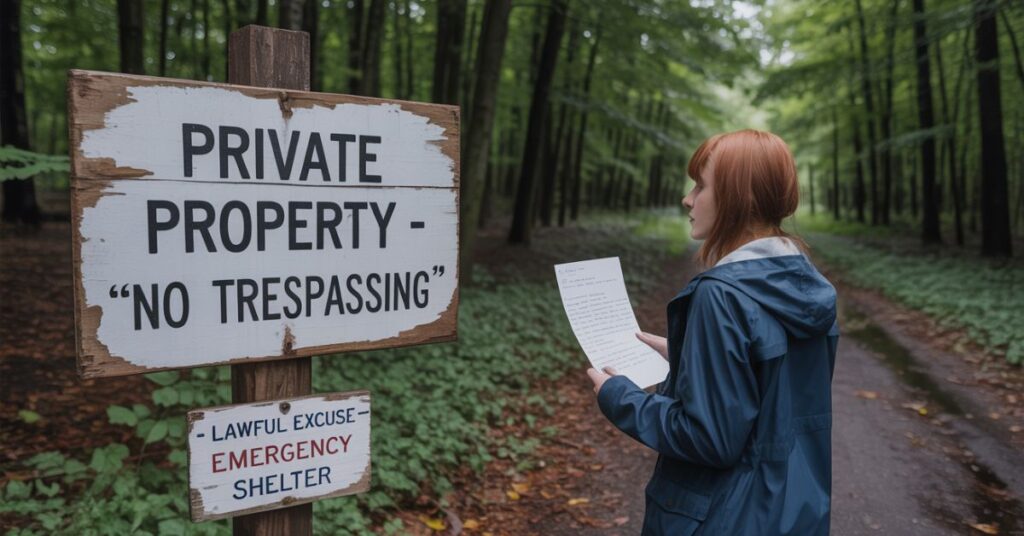Trespass is when someone enters or remains on land or property without permission. In most cases, it is considered a civil wrong (a tort), but in some situations, it can be treated as a criminal offense. Usually, the property owner or occupier has the right to control who enters their land. If someone enters without consent, it can lead to legal consequences.
However, not all trespasses are unlawful. Sometimes, a person may enter property for a reason that the law accepts. This is called a “lawful excuse.” In this article, we will explain what a lawful excuse means in the context of trespass, when it applies, and give clear examples of how it works in real-life situations.
Lawful Excuse: Definition & Legal Doctrine
A lawful excuse is a valid legal reason for doing something that would normally be illegal, such as trespassing. The law recognizes that in some situations, breaking the rules may be acceptable if there is a greater need or justification behind it.
In legal terms, a lawful excuse is often used as a defense. If someone is accused of trespassing but had a good reason, they can explain it to the court. If the excuse is accepted, they may not be held responsible.
Lawful excuse is not the same as getting permission. Permission comes directly from the owner. A lawful excuse is recognized by law even when the owner has not given consent.
Core Categories of Lawful Excuse
Consent / License
One of the simplest lawful excuses is when a person has permission to enter. This can be:
- Express consent: Directly told by the owner, like saying, “You can come in.”
- Implied consent: Based on behavior or signs, like a shop being open to customers.
This excuse only applies as long as the person follows the rules. If the owner withdraws permission or the person goes beyond what was allowed, the excuse ends.
Necessity
The defense of necessity means a person had to enter the property to prevent serious harm.
Private necessity: This happens when someone enters to protect themselves, others, or property from harm.
- Example: A person enters a neighbor’s land to rescue their pet from a fire.
Public necessity: This applies when someone acts to protect the general public.
- Example: A firefighter breaks into a house to put out a fire.
Courts usually accept necessity if the action was reasonable, urgent, and there was no other way.
Privilege by Law / Statutory Authority
Sometimes, the law gives certain people the right to enter property without it being trespass.
Examples:
- Police entering with a warrant.
- Utility workers entering to fix a gas leak.
- Health inspectors checking for violations.
These actions are backed by statutes (laws) and must be done according to legal procedures. If the person exceeds their authority, it may still count as trespass.
Self‑Defense / Defense of Others / Property
If someone enters property to protect themselves, another person, or valuable property from immediate danger, it can be a lawful excuse.
Example:
- A person hears someone screaming and enters a property to help them.
The law accepts this only if the response is reasonable. For example, using force when not necessary could make it unlawful.
Other Excuses / Justifications
Mistake of Fact
If someone honestly (and reasonably) believes they have permission to enter, they might not be guilty of trespass.
- Example: Entering a friend’s property thinking they were invited, but the invitation was for another day.
Courts will consider whether the mistake was honest and reasonable.
Implied Consent Based on Public Access
Some properties are open to the public, like stores, parks, or libraries.
- Example: Walking into a shop during business hours.
This consent can be taken away if the visitor misbehaves or refuses to leave when asked.
Limitations & Duties Accompanying the Excuse
Even if someone has a lawful excuse, there are limits. These include:
- Minimizing damage: If you enter by necessity, you should avoid causing harm.
- Acting reasonably: The excuse must match the situation. You cannot use extreme actions for a small problem.
- Not overstaying: Once the excuse ends, staying longer can become trespass.
For example, a person may be excused for entering during a storm, but not for staying the whole night if it’s no longer dangerous.
Limits & Rejection of Defenses
Courts do not accept all claimed excuses. Some common reasons for rejection include:
- Political or personal beliefs: Wanting to make a statement is not enough.
- Disproportionate actions: Using more force than necessary.
- Ignored signs or warnings: Entering clearly marked private property without emergency.
Even if a person had good intentions, the law looks at actions, not just motives.
Practical Guidance for Property Owners & Professionals
For property owners:
- Put up clear signs to show private areas.
- Give or withdraw permission clearly.
- If someone enters wrongly, ask them to leave. If they don’t, contact authorities.
For professionals (like police, inspectors, emergency workers):
- Always follow proper legal steps.
- Get permission or warrants when required.
- Act reasonably and explain your actions if needed.
Understanding lawful excuse helps both sides – the visitor and the property owner – avoid unnecessary legal trouble.
Conclusion
A lawful excuse for trespass means the law allows entry in special situations. These include having permission, facing an emergency, or acting under official authority. The action must be reasonable, necessary, and limited in scope.
Knowing when and how lawful excuse applies can protect people from legal problems and help property owners know their rights. Each situation depends on facts, so being careful and informed is the best way to stay within the law.


